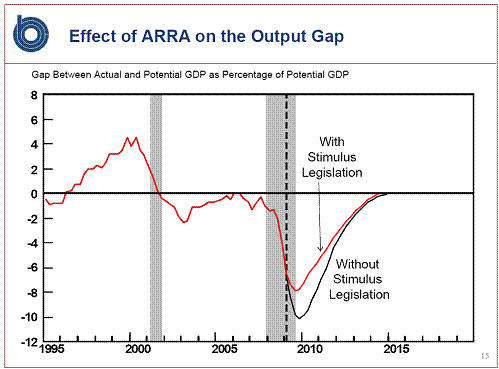Keith Hennessey critiques the stimulus package. Some points make sense, some points, well, I wonder. For instance, Hennessey argues the stimulus is not timely. As I’ve noted before, it’s not timely only if you think this will be a relatively short recession, characterized by a rapidly dissipating negative output gap. [0] [1] [2].
That scenario hardly seems to be the consensus, as indicated in CBO’s most recent analysis.

And, according to CBO, the output gap would have been even deeper and more persistent in the absence of the stimulus package, as constructed.
But I do agree that the package could have been better crafted. For instance, I did not see why the Republican moderates at the time of negotiation demanded a reduction in transfers to the states [3]. That seemed to me crazy on the efficiency and timeliness grounds that Hennessey highlights (see also Jim’s take on support for states). And yet, now we see the fiscal situation of the states deteriorating further, requiring additional cutbacks on government spending exactly when spending is most needed. [4]
On the other hand, I do disagree with Hennessey’s attraction to tax cuts (reminiscent of this view of the world). He bases his approach on the implications of the Hall version of the Permanent Income Hypothesis (essentially a Euler equation linked up with rational expectations). Well, as Campbell and Mankiw documented in a series of papers back in the early 1990s (and subsequently confirmed by subsequent research), the PIH seems to be a very poor characterization of consumption behavior. There seems to be a large share of “rule-of-thumb” consumers, who consume a constant share of income. If this behavior is being driven by liquidity constraints that arguably have become more binding with the financial crisis and economic recession, then the preference for permanent tax cuts over temporary is less well-founded (see discussion of the PIH here).
So, while I think that while it would be preferable to have the spending quickly implemented, the single-minded concern for speed is based upon a highly unlikely scenario. In any case, according to CBO, most of the spending will take place within the next 16 months (19.5 months from when the bill was passed).
An aside: I was amused by Hennessey’s lauding of the 2003 tax cut as effective fiscal stimulus. I think we know that we are partly where we are — hamstrung with massive inherited Federal debt, much owed to the Chinese, and an overextended household sector — exactly because of that ill-advised measure [5] (stacked on top of the 2001 tax cuts).
Relevant and Irrelevant Criticisms of the Stimulus Package
- Bulenox: Get 45% to 91% OFF ... Use Discount Code: UNO
- Risk Our Money Not Yours | Get 50% to 90% OFF ... Use Discount Code: MMBVBKSM
Disclaimer: This page contains affiliate links. If you choose to make a purchase after clicking a link, we may receive a commission at no additional cost to you. Thank you for your support!


Leave a Reply